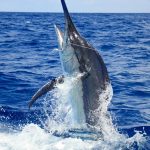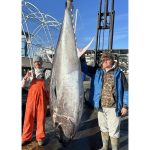ROFFS™ Fishy Times Newsletter – 76th Edition – Updated Videos/Catch Reports, Why You Should Never Eat Tilapia & Dead Zone Developing in GOM
NEWS
Updated Videos on ROFFS™.com – Be Sure to Check Out the “Hot News” Button on the ROFFS™ Homepage
Rare Shark Feeding Frenzy in North Carolina!

On Thursday, October 9 at around noon, while at a retreat at Cape Lookout National Seashore off the coast of North Carolina, the leaders of One Harbor Church witnessed a shark feeding frenzy. The men were out fishing for the evening’s dinner when they stumbled across more than 100 sharks attacking a school of blue fish. As seagulls and pelicans joined in on the meal, the men began to cast into the surf, catching fish without the use of bait. For more than five minutes, the sharks were observed swimming in and out of the surf, some of which became beached in the fury. Donnie Griggs, the cameraman who captured the footage, is an avid waterman who spearfishes, dives, swims and surfs at Cape Lookout often. We want it to be clear that Cape Lookout and the surrounding beaches of Eastern North Carolina are extremely safe for swimming. The presence of these sharks and large schools of fish is actually a sign of a very healthy ecosystem. Video Courtesy: Brian Recker | YouTube
Please click HERE to watch the video on our website now!
Commercial Squid Jigging

Video Courtesy: Fast fishing | Facebook
Please click HERE to watch the video on our website now!
Crab Vs. Octopus!

Run Crab, Run for Your Life! Video Courtesy: Latinos Post | Facebook
Please click HERE to watch the video on our website now!
Land on This!

Military helicopter landing on ship during very heavy seas…Video Courtesy: Friends of BN – Barisan Nasional | Facebook
Please click HERE to watch the video on our website now!
How to Dock Like a Boss!

This video was made for AV-OG-TIL a Norwegian NGO, working to reduce the harmful effects of alcohol. The aim is to raise awareness around the dangers of intoxication while operating a boat, driving a car, when pregnant or together with children. Docking is an art form best practiced sober. Video Courtesy: AV-OG-TIL uten alkohol | YouTube
Please click HERE to watch the video on our website now!
Why You Should Never Eat Tilapia
Article Courtesy: realfarmacy.com | Originally published June 20, 2015
Tilapia , one of the cheapest and most popular fish in the United States, may actually lead to many serious health problems.
Their feed is not natural — in the wild, tilapia would eat algae and lake plants, but the farms fatten up the fish on GMO corn and soy pellets. The amount of healthful fish oils in these creatures is almost non-existent, negating the main reason why fish is so good for us. Almost all tilapia sold in the U.S. is hormone drug treated. Did you know that the low price of tilapia is achieved by converting the young females to males through the use of the hormone drug 17 alpha-methytestosterone? Having an all male population allows fish farmers to produce larger fish in a short period of time.
Additionally, Farmed fish consist of more fat and less Omega-3 fatty acids due to the smaller area in which they swim, and the constant availability of food. Unlike many other fish, farm-raised tilapia contains high levels of omega-6. Because it contains less than 0.5 grams of omega-3s per 100 grams of fish the imbalance of omegas has an inflammatory effect on the body.

Please click here to read more on why you should never eat tilapia on our website now!
Connecticut-Sized Dead Zone Expected in Gulf of Mexico
Article Courtesy: Earth & Space Science News by: JoAnna Wendel | Originally Published: June 18, 2015
An ensemble of four computer models evaluated river runoff, wind patterns, and other factors affecting the extent of oxygen-poor waters near the Mississippi River’s mouth.
The National Oceanic and Atmospheric Administration (NOAA) released on Wednesday its prediction of the size of the annual Gulf of Mexico dead zone, which the agency forecasts to span about 14,200 square kilometers—about the area of the state of Connecticut. The actual size of this summer’s dead zone will be studied and announced in early August.
This huge expanse of oxygen-depleted Gulf waters just beyond the Mississippi River Delta forms every summer after nutrients from wastewater and vast amounts of fertilizer used by farmers wash down the river and run off the Louisiana and Texas coasts during the rainy spring. The extra nutrients—mainly chemical compounds containing nitrogen or phosphorous—nourish huge blooms of algae.
When the algal blooms eventually die, they fall to the sea bottom and decompose, soaking up the available dissolved oxygen. As oxygen levels fall too low to sustain most marine life, bottom-dwelling animals like crabs and shrimp cannot thrive and often flee the area, which can devastate the Gulf’s seafood industry. Other, less mobile species may not survive.
“What we’re trying to do is better understand the variability in size [of the dead zone] from year to year so we can better inform fisheries and management along the Gulf Coast” about where and when to expect potential shortages in their catch, said Dan Obenour, an environmental engineer at North Carolina State University, Raleigh.

A visualization of how nutrient runoff from farms (green) and cities (red) in the Mississippi River Basin influences algal blooms in the Gulf of Mexico. The warmer colors represent a higher concentration of algae. NOAA scientists predict that the size of the 2015 Gulf of Mexico dead zone, which is caused by the decomposition of these blooms, will be about the size of Connecticut. Credit: NOAA
Don’t Forget to Send Us Your Fishing Reports for our Weekly Catch Reports!

Above: Congratulations to ROFFS™ client, Captain Johnny Dorland and Angler Lance Hill (Team Cotton Patch) with their 899.6 lb blue marlin. Not only is this 1st place win for the Championship, but also a tournament record in the 13th Annual Emerald Coast Blue Marlin Classic in Sandestin.
Please click here to view the most recent catch reports on our website now!
Backlash? Feedback?
As always, please send comments & feedback on Fishy Times newsletter content directly to us at feedback@roffs.com.

*|FACEBOOK:LIKE|*
If you do not want to wait for our next Fishy Times newsletter, please visit us in the meantime to get all your fishing news on Facebook, Twitter, YouTube and on the web. Safe and successful fishing until next time!






